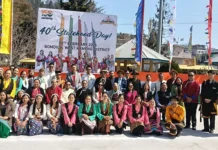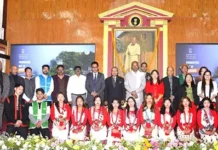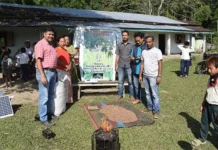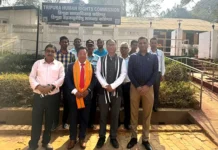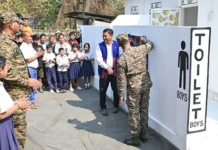BASAR, Aug 23: About 30 participants, including officials of the agriculture and allied departments from Leparada, West Siang and Upper Siang districts along with progressive farmers attended the second day of the state level workshop on ‘Scientific management of fall armyworm (FAW) in maize production’ at the ICAR’s farm in Gori near here in Leparada district on Friday.
The programme, which was organised by the state centre of the ICAR here, was aimed at creating awareness on FAW infestation in maize, and to prevent crop damage by FAWs in the state.
Addressing the participants, the ICAR’s Basar Centre Joint Director Dr H Kalita said “management of FAWs is imperative to prevent yield loss of maize as it is an important crop in Arunachal.”
The ICAR’s Umiam (Meghalaya) centre’s Crop Protection Head GT Behere stressed on the importance of spreading awareness on FAWs “as they are polyphagus and voracious feeder,” adding that FAWs are known to have the ability to develop resistance against pesticides.
“Therefore, other approaches, like biological, physical and cultural methods should be used for FAW management,” he said.
West Siang KVK Head Dr CS Raghav also spoke.
Later, Dr Behere delivered a presentation on ‘Occurrence of invasive pest and their potential for damaging crops in NEH region’, and apprised the participants of the trans-boundary insect migration in the Northeast due to the porous international borders and unregulated movement of commodities,” management of invasive pests, identifying and managing FAWs using low-cost pheromone traps or bird perches, deep summer ploughing, whorl application with sand, etc.
He said organic management is the best method for controlling FAWs in Arunachal “as the mandate of the state is to become an organic state.”
Dr Behere said “organic methods of FAW management will not disturb the natural ecosystem.” He also displayed the prime symptoms of FAW infestation to the participants.
Trg on maize production held
The ICAR centre here on Friday also organised a ‘training-cum-demonstration programme on scientific maize production technology’ at the same venue.
The aim of the programme, which also saw the attendance of about 30 participants, including officials of the agriculture and allied departments from Leparada and West Siang districts, the West Siang KVK, and progressive farmers, was to inform the farmers about the scientific technology to increase maize production.
ICAR Basar Centre Joint Director Dr H Kalita spoke on the economic importance of maize in Arunachal, adding that value addition and post-harvest management of maize or babycorn “can be a good source of revenue generation for tribal farmers.”
He said it is for this reason that scientific cultivation of maize in Arunachal is crucial.
Issues related to insect pest management, soil fertility management, and soil moisture conservation in maize cultivation in the hilly ecosystem of the state were deliberated on by Dr Kalita, while the centre’s soil scientist Dr Ampee Tasung spoke on ‘Soil fertility enhancement through liming and organic inputs’ and soil scientist Dr Jitendra Kumar spoke on ‘Soil moisture conservation measures for maize cultivation in hilly ecosystem of Arunachal’.
The participants interacted with the resource persons regarding the feasibility of organic management practices of insect pest in maize, liming benefits, management of erratic soil moisture stress, post harvest management of maize, etc.
The participants were later shown a demonstration at the ICAR’s farm in Gori.

